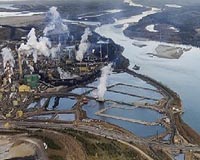 |
Luanda, Angola (UPI) Jan 15, 2009 The recent killing of two members of Togo's national soccer squad in Angola during an African tournament by separatist rebels from oil-rich Cabinda province marked an escalation in their long-simmering war over the West African state's energy wealth. The high-profile killings on Jan. 8 in Cabinda, the center of Angola's burgeoning oil industry and the core of its economy, can be expected to trigger a government crackdown against the separatists that will intensify the violence. Cabinda, a 2,800-square-mile territory on the Atlantic coast, is separated from the rest of Angola by a 37-mile sliver of territory belonging to the Democratic Republic of the Congo and by the mighty Congo River. Most of Angola's oil production is located offshore, which has diminished the province's importance somewhat. But oil, along with diamonds, account for 99 percent of the country's exports, so Luanda is reluctant to relinquish Cabinda. Angola is now the continent's leading oil producer, with some 1.9 million barrels per day, having eclipsed troubled Nigeria. The Americans, which during the Cold War sought to cripple the Soviet-backed liberation-movement-turned-government in Luanda, now see the country as a vital energy source for the years ahead. So does China, which has hefty commercial alliances with the state-run oil monopoly, Sonangol. This rivalry could well intensify, not just in Angola, but across the entire region, which is emerging as a major source of oil as new fields are discovered, while Middle Eastern reserves are declining. Cabinda has been wracked by rebellion, led by the Front for the Liberation of the Enclave of Cabinda since 1975, when Angola gained its independence from Portugal. At that time, Angola was torn by a civil war between the Marxist MPLA and rivals backed by the United States and South Africa. Africa's longest civil war ended in 2002 with the MPLA firmly entrenched in Luanda. "Today the superpowers are still interested in the country, but they are fighting for control of Angola's vast oil wealth in a different way," according to Foreign Policy in Focus. Luanda reached a peace agreement with FLEC in mid-2006 and pledged to give Cabinda a greater share of oil revenues. But hard-line factions have continued to fight the government. The soccer killings raised the ante. The MPLA government, under its lifetime president of 30 years, Jose dos Santos, has been at pains to show that Angola is now pacified and eager for foreign investment. With most oil production offshore, FLEC has little chance of disrupting the flow of oil, unlike anti-government rebels in southern Nigeria whose attacks on oil installations have slashed production by 1 million barrels a day and cost the state $1 billion a month in lost revenue. But the Cabinda rebels remain a significant thorn in Luanda's side, tying down 30,000 troops. FLEC has relied on neighboring states, particularly the DRC and the Republic of the Congo, for sanctuary. This has fostered the kind of interstate hostility that is the plague of the African continent, which seems to be in perpetual ferment. The major oil discoveries in West Africa have only heightened these rivalries. Both Congos covet Angola's oil resources, and tension has flared recently between Luanda and Kinshasa over the delineation of their maritime boundaries, which will determine their shares of offshore oil reserves. On Jan. 11 Cabindan Affairs Minister Antonio Bento Bembe, a former FLEC chief taken into the government under the 2006 peace deal, warned both Congos that Luanda's forces would pursue the rebels into their territories. That's not seen as an idle threat. During the 1975-2002 civil war MPLA forces played a key role in a 1997 coup in the Republic of Congo, the same year they participated in the overthrow of Mobutu Sese Seko of the former Zaire. They carried out bombings in Zambia in 1999. All these states had supported the MPLA's rivals. "Angolan security forces are capable of making good on this promise and another regional power -- South Africa -- will be watching developments very closely," according to U.S.-based security consultancy Stratfor. South Africa is considered the major power in sub-Saharan Africa. Angola, backed by its oil wealth, is widely seen as gearing up to challenge it for dominance of southern Africa, and that makes holding onto Cabinda more important than ever.
Share This Article With Planet Earth
Related Links Powering The World in the 21st Century at Energy-Daily.com
 Report: no finger pointing at oil sands
Report: no finger pointing at oil sandsEdmonton, Alberta (UPI) Jan 15, 2009 Canada's oil sands should not be singled out as the source of Canada's poor record on greenhouse gas emissions, says a Conference Board of Canada report. The report, "Getting the Balance Right: The Oil Sands, Exporting and Sustainability," says oil sands producers must continue to develop new technologies and processes that reduce emissions during extraction. At the same time, the repor ... read more |
|
| The content herein, unless otherwise known to be public domain, are Copyright 1995-2009 - SpaceDaily. AFP and UPI Wire Stories are copyright Agence France-Presse and United Press International. ESA Portal Reports are copyright European Space Agency. All NASA sourced material is public domain. Additional copyrights may apply in whole or part to other bona fide parties. Advertising does not imply endorsement,agreement or approval of any opinions, statements or information provided by SpaceDaily on any Web page published or hosted by SpaceDaily. Privacy Statement |